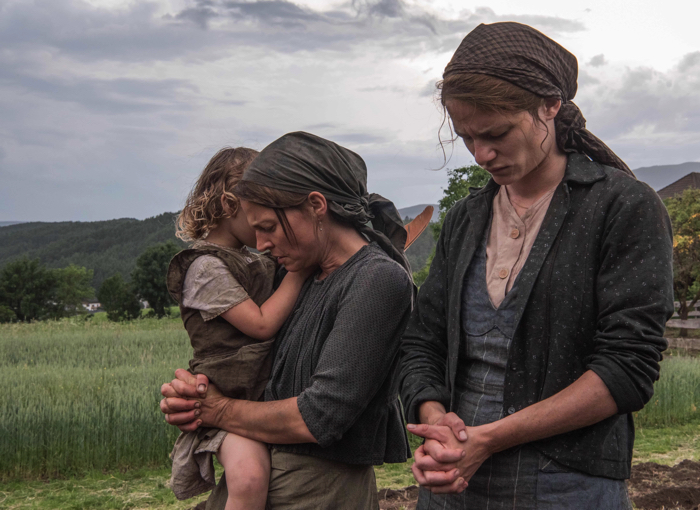
Dir|Wri: Terrence Malick | Cast: August Diehl, Valerie Pachner, Michael Nyqvist, Matthias Schoenaerts, Bruno Ganz, Karl Markovics, Franz Rogowski | US Drama 173′
Terrence Malick brings his tenth feature to Cannes with a reputation in the balance. Although appreciated by a small cadre of Malickians, his post-Tree of Life output even his defenders seem to agree needs defending.
So is A Hidden Life a return to form, or is it another stage in a sad decline. Well, the truth is: a bit of both. It tells the true story of conscientious objector Franz Jägerstätter (August Diehl) and his wife Fani, played by Valerie Pachner, who lived in St. Radegund, an Austrian farming community. Beautiful mountains form a backdrop, an idyll just as the tropical islands did prior to the hostilities of The Thin Red Line. But war is approaching fast with Hitler, a native of the same region, glowering from newsreel footage and ripping through first France and then into Austria. At this point, Franz decides that he cannot swear an oath of allegiance to a man he views as the antiChrist. How he comes to this conclusion is unclear as Malick’s typically syllopsistic style means we never see him read a newspaper or watch any of the newsreels we see.
Everyone in the village tries to persuade Franz against his decision from the ultra-nationalistic mayor to the well-meaning priest. Again the gaps in the narrative made by the relentless moving fluttering from one beautiful image to another means that we weirdly never hear Jews mentioned, despite the fact that anti-Semitism was rife. Hitler wasn’t some exceptional monster. His hatred and xenophobia and anti-Semitism were a product of his Austrian upbringing. This was by no means exclusive to Austria or Germany, but there was a particular virulence which made the message of National Socialism resonate. But according to Malick everyone just wanted to cut grass and drink beer.
Franz’s rebellion is religious and almost anti-political. And again Malick’s style favours this approach. There are no dialogues in Terrence Malick’s cinema and it is almost impossible to talk about politics without allowing people to actually talk. We have a series of monologues directed at characters which typically take place in the context of some photogenic meandering. The letters which form the bulk of the voiceover (yes, there’s voiceover) simply reiterate much of what we’re seeing on screen. But again I never felt that above a lot of PDAs there isn’t much of a relationship between Franz and Fani. They say they love each other a lot, but again they don’t argue and frankly I don’t trust a couple that doesn’t argue from time to time. They also have three extremely pretty daughters, Franz’s mother, who frequently looks pitiable against a white washed wall and Fani’s spinster sister living with them.
A film with no scenes is way too long at three hours. Joerg Widmer’s camera peers into faces with a distracting lack of respect for personal space before zooming off to look for something else to be interested in. Again, the absence of the conventional blocking of scenes means that often actors are left to wander like non-player characters in a mid-90s video game. And the decision to make the film bilingual with the Nazis speaking German and the protagonists English is a ludicrous one. How can you aim to be daring as filmmaker on one hand and then submit to such a lazy Hollywood convention? And one with such damaging effect on your political position.
But again, what political position? I respect the true story behind this but Malick seems to want the whole of the second world war and the moral universe to hang in the balance here. Franz is held up as an exemplar – something like Carl Theodor Dreyer’s Joan of Arc – but I couldn’t help but think of him as something of a von Trapp. His refusal to say the oath – he is offered the chance to work in a non-combat capacity – feels petty in the face of the unnamed Holocaust which is going on at exactly the same time.
Ultimately, Malick has made another technically beautiful film, with a gorgeous soundtrack and wonderful photography, that is at the same time unable or unwilling to engage with its subject. In always trying to go for the glory, he seems to miss what it is that makes us essentially human. We talk to each other. John Bleasdale
ON RELEASE FROM 17 JANUARY 2020